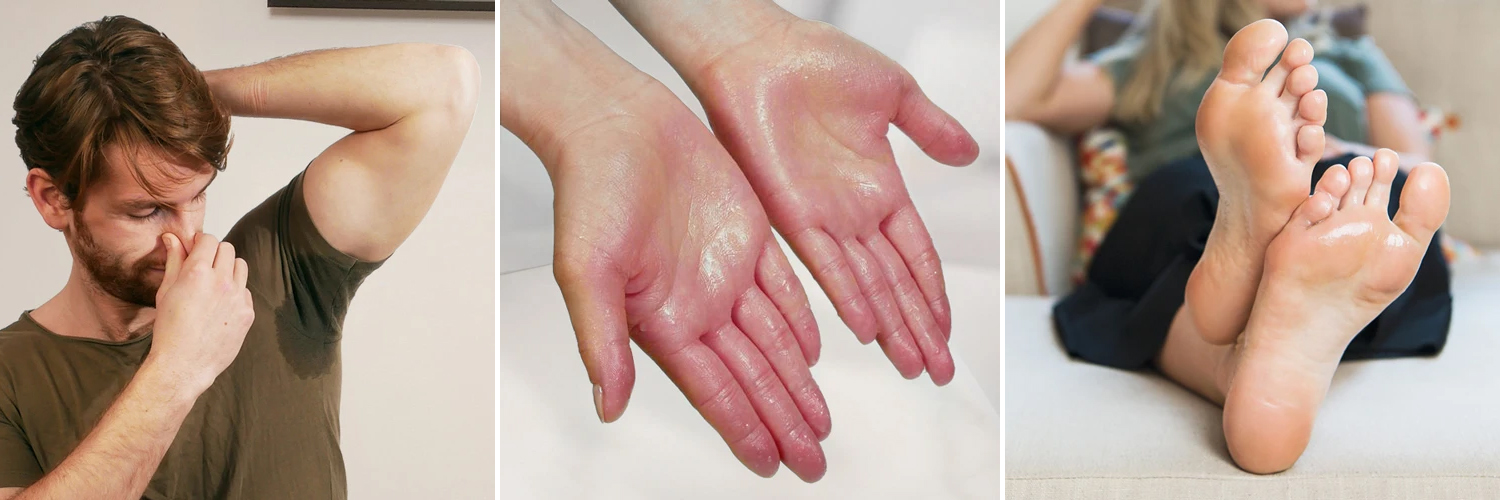Comprehending the Origin Causes of Excessive Sweating and Its Effect on Every Day Life
While it is typically understood as a physical response to manage body temperature level, the triggers for extreme sweating can vary extensively amongst individuals, encompassing not just physical aspects however also psychological and mental aspects. By delving right into the root causes of hyperhidrosis and discovering its multifaceted results, a much deeper understanding of this pervasive concern can be gotten, shedding light on the intricacies that individuals grappling with too much sweating browse on a daily basis.
Physiology of Sweat Glands
The regulation of sweat production, a critical physiological procedure, is primarily managed by the task of sweat glands distributed across the human body. Sweat glands are classified right into two primary kinds: eccrine and apocrine glands.
When the body temperature level rises, either because of exercise, heats, or psychological tension, the nerve system activates the sweat glands to create sweat. This sweat is made up mainly of water and electrolytes like salt and chloride. The procedure of sweat manufacturing is necessary for keeping the body's internal temperature within a slim, optimal array, highlighting the essential role gland play in human physiology.
Triggers for Excessive Sweating
In comprehending the origin of too much sweating, it is essential to determine the triggers that can cause this physical feedback. Excessive sweating, also referred to as hyperhidrosis, can be triggered by different aspects, both physical and environmental. One typical trigger is emotional anxiety or stress and anxiety, which can promote the body's gland to create more sweat than is required for cooling. Physical effort, heats, and spicy foods are also known to set off excessive sweating in individuals vulnerable to this problem. In addition, particular clinical conditions like diabetes, menopause, or hyperthyroidism can add to extreme sweating as well.
Moreover, medications such as some antidepressants, opioids, and certain supplements can additionally serve as triggers for hyperhidrosis. Understanding these triggers is necessary in handling too much sweating efficiently - How to stop sweaty hands. By recognizing and attending to the specific triggers that trigger too much sweating in a private, medical care carriers can develop individualized treatment plans to relieve this condition and enhance the person's lifestyle
Medical Issue Associated
Associated with extreme sweating are numerous medical conditions that can worsen this physical reaction. One typical problem is hyperhidrosis, a disorder defined by extraordinarily raised sweating that exceeds the body's thermoregulatory requirements. This can show up in focal areas like the palms, soles, underarms, or face, affecting a person's lifestyle due to social embarrassment and discomfort.
Additionally, endocrine disorders such as hyperthyroidism, diabetes, and menopausal warm flashes can likewise lead to extreme sweating. Hyperthyroidism causes an overflow of thyroid hormonal agents, speeding up metabolism and causing sweating.
In addition, infections like endocarditis, consumption, and hiv have been linked with night sweats, a common signs and symptom understood to disrupt rest and affect total wellness. These clinical problems highlight the diverse variety of underlying elements that can add to too much sweating, requiring extensive evaluation and monitoring by healthcare specialists.
Emotional and Emotional Elements

Effect on Social Communications
Extreme sweating can have extensive effects on a person's capacity to engage pleasantly in social interactions. The noticeable indicators of sweat stains or damp spots on clothes can bring about embarrassment and self-consciousness, triggering people to withdraw from social circumstances. This withdrawal can influence relationships, limitation social tasks, and hinder personal and specialist growth.

In addition, the anxiety and self-esteem issues coming from extreme sweating can influence interaction and social abilities. People might battle to concentrate on conversations, take part in group activities, or express themselves confidently. This can result in feelings of isolation and solitude, as social connections end up being challenging to preserve.
Final Thought

While it is typically understood as a physical action to control body temperature, the triggers for excessive sweating can differ commonly among people, incorporating not only physical elements but emotional and additionally emotional elements. By diving into the root creates of hyperhidrosis and exploring its multifaceted results, a deeper understanding of this prevalent problem can be acquired, losing light on the intricacies that individuals grappling with too much sweating navigate on a day-to-day basis.
Physical effort, high temperatures, and spicy foods are additionally understood to trigger extreme sweating in individuals susceptible to this condition. By identifying and resolving the particular triggers that motivate extreme sweating in an individual, health care companies can develop individualized treatment strategies to alleviate this problem and improve the individual's top quality of life.
Excessive sweating can have extensive results on an visit site individual's capacity to involve comfortably in social interactions.